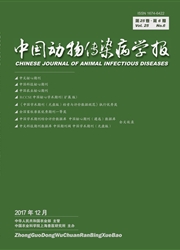

 中文摘要:
中文摘要:
Porcine reproductive and respiratory syndrome(PRRS) is considered to be one of the most important infectious diseases impacting the swine industry and is characterized by reproductive failure in late term gestation in sows and respiratory disease in pigs of all ages.The nonstructural protein 9 gene,Nsp9,encoding the RNA-dependent RNA polymerase,is generally regarded as fairly conserved when compared to other viral proteins.Antibodies against Nsp9 will be of great importance for the diagnosis and treatment of the causal agent,PRRS virus.A study was undertaken to generate polyclonal antibodies against the immunodominant Nsp9.For this purpose,the Nsp9 was expressed in Escherichia coli and subsequently used as an antigen to immunize New Zealand rabbits.Antiserum was identified via an indirect ELISA,and then verified based on the ability to react with both naturally and artificially expressed Nsp9.Results of virus neutralization test showed that this antiserum could not neutralize the PRRSV.Nevertheless,this antiserum as a diagnostic core reagent should prove invaluable for further investigations into the mechanism of PRRS pathogenesis.
 英文摘要:
英文摘要:
Porcine reproductive and respiratory syndrome (PRRS) is considered to be one of the most important infectious diseases impacting the swine industry and is characterized by reproductive failure in late term gestation in sows and respiratory disease in pigs of all ages. The nonstructural protein 9 gene, Nsp9, encoding the RNA-dependent RNA polymerase, is generally regarded as fairly conserved when compared to other viral proteins. Antibodies against Nsp9 will be of great importance for the diagnosis and treatment of the causal agent, PRRS virus. A study was undertaken to generate polyclonal antibodies against the immunodominant Nsp9. For this purpose, the Nsp9 was expressed in Escherichia coli and subsequently used as an antigen to immunize New Zealand rabbits. Antiserum was identified via an indirect ELISA, and then verified based on the ability to react with both naturally and artificially expressed Nsp9. Results of virus neutralization test showed that this antiserum could not neutralize the PRRSV. Nevertheless, this antiserum as a diagnostic core reagent should prove invaluable for further investigations into the mechanism of PRRS pathogenesis.
 同期刊论文项目
同期刊论文项目
 同项目期刊论文
同项目期刊论文
 The Cellular Interactome of the Coronavirus Infectious Bronchitis Virus Nucleocapsid Protein and Fun
The Cellular Interactome of the Coronavirus Infectious Bronchitis Virus Nucleocapsid Protein and Fun ?A novel porcine reproductive and respiratory syndrome virus vector system that stably expresses enh
?A novel porcine reproductive and respiratory syndrome virus vector system that stably expresses enh Characterization of the biochemical properties and identification of amino acids forming the catalyt
Characterization of the biochemical properties and identification of amino acids forming the catalyt Identification of immunodominant T-cell epitopes in membrane protein of highly pathogenic porcine re
Identification of immunodominant T-cell epitopes in membrane protein of highly pathogenic porcine re Generation of an infectious clone of HuN4-F112, an attenuated live vaccine strain of porcine reprodu
Generation of an infectious clone of HuN4-F112, an attenuated live vaccine strain of porcine reprodu Expression and Antibody Preparation of GP5a Gene of Porcine Reproductive and Respiratory Syndrome Vi
Expression and Antibody Preparation of GP5a Gene of Porcine Reproductive and Respiratory Syndrome Vi Stable expression of foreign gene in nonessential region of nonstructural protein 2 (nsp2) of porcin
Stable expression of foreign gene in nonessential region of nonstructural protein 2 (nsp2) of porcin Identification of nonessential regions in nsp2 gene of an attenuated porcine reproductive and respir
Identification of nonessential regions in nsp2 gene of an attenuated porcine reproductive and respir Immune responses in piglets infected with highly pathogenic porcine reproductive and respiratory syn
Immune responses in piglets infected with highly pathogenic porcine reproductive and respiratory syn Sequence analysis of NSP9 gene of 25 PRRSV strains from Guangdong province, subtropical southern Chi
Sequence analysis of NSP9 gene of 25 PRRSV strains from Guangdong province, subtropical southern Chi GENETIC DIVERSITY ANALYSIS OF THE ORF5 GENE IN PORCINE REPRODUCTIVE AND RESPIRATORY SYNDROME VIRUS S
GENETIC DIVERSITY ANALYSIS OF THE ORF5 GENE IN PORCINE REPRODUCTIVE AND RESPIRATORY SYNDROME VIRUS S Molecular epidemiology of PRRSV in South China from 2007 to 2011 based on the genetic analysis of OR
Molecular epidemiology of PRRSV in South China from 2007 to 2011 based on the genetic analysis of OR 期刊信息
期刊信息
